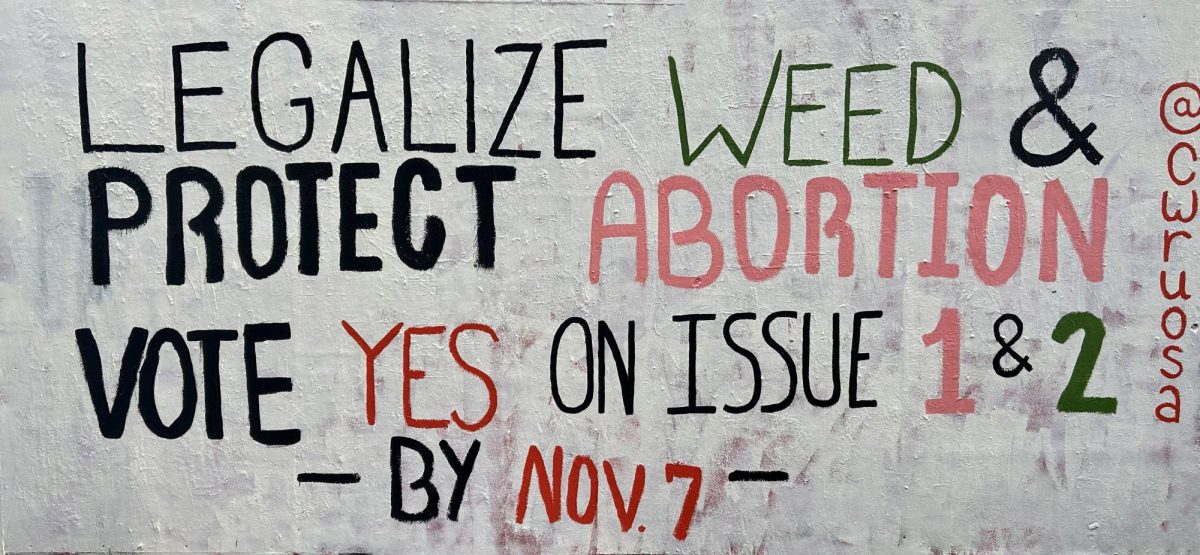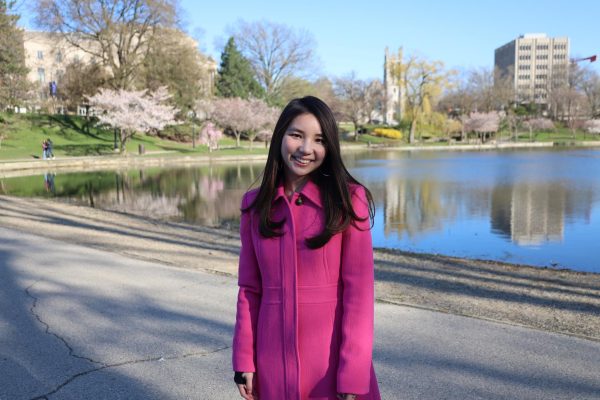Much is at stake in Ohio’s Nov. 7 General Election—namely abortion access and marijuana legalization. This election is particularly important in forming the future of Ohio’s legislation and may be the most consequential in the state’s recent history.
For those who are registered to vote in Ohio, absentee voting by mail and in-person early voting began Oct. 11 and continues until Nov. 5. Students can visit the Center for Civic Engagement and Learning (CCEL) office to request an absentee ballot by Oct. 31. According to fourth-year CWRUVotes Democracy Fellow Phuong Nguyen, the ballot will need to be postmarked by Nov. 6 or dropped off at the Cuyahoga County Board of Elections.
To vote in-person, students must bring a valid Ohio ID or a passport to the polling location. On Election Day, from 6:30 a.m. to 7:30 p.m., registered voters can cast their in-person ballot.
As described by the Editorial Board earlier this semester, Issue 1 puts the debate about abortion rights into the hands of voters, the only state to be doing so this year. If passed, Ohio residents will have the right to decide their own reproductive medical treatment, including abortion. This follows the Supreme Court’s overturning of Roe v. Wade in 2022, which gave individual states the power to determine reproductive freedom. If Issue 1 does not pass, the six-week abortion ban without exceptions for rape or incest could be reinstated.
Second-year and Advocacy Director of PERIOD @ CWRU Abigail Gilman also voted in favor of Issue 1 during in-person early voting.
“We deserve to make decisions about our bodies without government input,” Gilman said. “I believe we are all entitled to reproductive freedom, and Issue 1 would solidify that right for Ohioans!”
Issue 2 concerns recreational marijuana legalization and will allow adults over 21 years of age to purchase and possess up to 2.5 ounces of cannabis flower and 15 grams of extract. This initiative was spearheaded by the Coalition to Regulate Marijuana Like Alcohol, and—if passed—would make Ohio the 24th state to legalize cannabis. Proponents of the amendment argue that legalization brings cultural and economic benefits, the positive experiences of the 23 states who have already legalized marijuana. Tax revenue is also expected to surge with a proposed 10% tax on every sale, yielding an extra hundreds of millions of dollars annually.
Fourth-year political science student Sakthiram Kumar said he will vote in favor of Issue 2.
“I’m told that marijuana legalization is beneficial for economic reasons, but this isn’t what drives me to vote ‘Yes’ for Issue 2,” Kumar said. “In my view, legalizing weed could help improve the criminal justice system as it has the possibility of combatting the racial bias present in marijuana enforcement.”
Also basing her decision off of the criminal justice system, Gilman voted in favor of Issue 2.
“Legalizing recreational marijuana would greatly reduce the number of petty criminal charges. Legalization will also make marijuana safer since it has to go through a regulatory process,” she said.
Those on the opposing end, such as State Representative Josh Williams, have voiced concerns about safety, highlighting how unrestricted access to marijuana may increase operating a vehicle impaired (OVI) cases and ease accessibility to children if grown at home.
The People’s Budget—Issue 38—will be exclusively on Cleveland residents’ ballots. Earlier this year, a coalition of Cleveland residents, called People’s Budget Cleveland (PB CLE), petitioned the city council for residents to decide how a portion of the city’s budget would be spent. When the council did not approve, PB CLE gathered enough signatures to put Issue 38 on the ballot. If passed, this could allow residents to manage up to 2% of the city’s budget. This process of participatory budgeting is already implemented in cities such as Chicago, New York City and Grand Rapids, Michigan.
Aside from Issues 1 and 2, ballot issues will vary by residential county, and the ballot will include all precincts and wards. A full list of the issues and candidates for Cuyahoga County can be viewed on the Cuyahoga County Board of Elections website.
Kumar said the classes he’s taking this semester touched on topics in Issues 1 and 2, which helped him make educated decisions in his vote.
“I try to keep myself up-to-date on the news regarding these issues,” he said. “I also try to listen to different perspectives on topics I’m interested in to make informed decisions.”
Prior to going to the polls, Gilman said she researched the issues, formed her opinions and knew how she would vote.
She said, “I’ve read about the issues on the ballot … and formed my opinions based on that information.”
Third-year student Democracy Fellow for CWRUVotes Hannah Jackson said students can visit the CCEL office to view their off-campus in-person voting location or use the TurboVote website.
Kumar mentioned the difficulty of taking time to vote in-person while balancing his academic responsibilities.
“Students who want to vote must juggle their civic and academic responsibilities,” he said. “This isn’t conducive to promoting student civic engagement, so I hope CWRU makes Election Day a holiday soon!”
While CWRU will not have voting locations on campus, Jackson emphasized the importance of putting in the effort to vote.
“Voting is one of the best ways that students can make their voices heard and create the world that they want to see,” she said. “By being a consistent voter, you are actively shaping the future of our democracy.”



